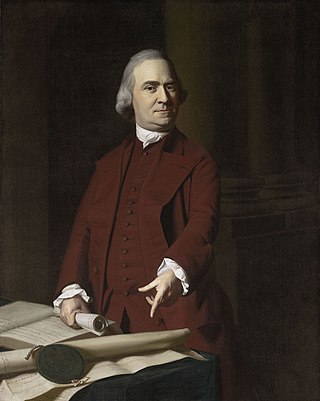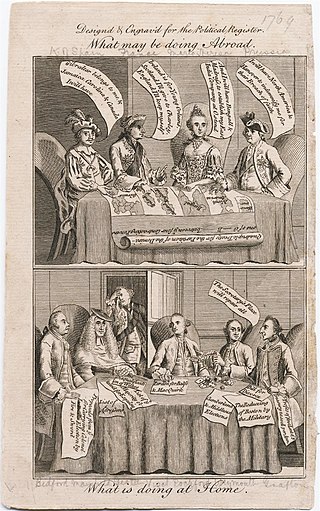In popular culture

- In the 2008 American miniseries, John Adams , Preston was played by British actor Ritchie Coster. [2]
- In the 2015 History Channel miniseries, Sons of Liberty, Preston was portrayed by Shane Taylor.
Captain Thomas Preston (c.1722—c. 1798) was a British military officer who served in Boston, Massachusetts. He commanded the troops involved in the Boston Massacre in 1770 and was tried for murder, but was acquitted. Historians have never settled whether he ordered his men to fire on the colonists. Preston was originally from Ireland; his people were among the Protestants settled there. [1]
Preston was a captain of the 29th Regiment of Foot, part of the British garrison in Boston under the overall command of Thomas Gage. He was present at the Boston Massacre, also known as the Incident on King Street, when on 5 March 1770 a group of soldiers from the 29th fired on colonists of the city, after an aggressive mob had confronted them and thrown snowballs, clubs, and rocks at them. Captain Thomas Preston showed up on the scene to help the other troops.
Charges were brought against him and other soldiers, but he was acquitted in a trial held in Boston, Massachusetts. Future United States President John Adams was his attorney. An eyewitness report by John Tudor, who was a merchant, says that Preston gave the order to fire, but many historians believe that he did not. Two of his men, Hugh Montgomery and Matthew Kilroy, were found guilty of manslaughter. They "prayed clergy" to avoid the death sentence. Instead, they were branded on the thumb with a hot iron, the letter "M" for murder. Captain Preston was tried separately. The main issue was whether or not he had called the order to fire, he was found not guilty.
After his trial, Preston retired from the army. He reportedly settled in Ireland. Adams later recalled seeing him in London in the 1780s, when Adams was serving there as US Minister to Britain.


John Hancock was an American Founding Father, merchant, statesman, and prominent Patriot of the American Revolution. He served as president of the Second Continental Congress and was the first and third Governor of the Commonwealth of Massachusetts. He is remembered for his large and stylish signature on the United States Declaration of Independence, so much so that the term John Hancock or Hancock has become a nickname in the United States for one's signature. He also signed the Articles of Confederation, and used his influence to ensure that Massachusetts ratified the United States Constitution in 1788.

The Boston Massacre was a confrontation in Boston on March 5, 1770, in which nine British soldiers shot several of a crowd of three or four hundred who were harassing them verbally and throwing various projectiles. The event was heavily publicized as "a massacre" by leading Patriots such as Paul Revere and Samuel Adams. British troops had been stationed in the Province of Massachusetts Bay since 1768 in order to support crown-appointed officials and to enforce unpopular Parliamentary legislation.

Crispus Attucks was an American whaler, sailor, and stevedore of African and Native American descent, who is traditionally regarded as the first person killed in the Boston Massacre, and as a result the first American killed in the American Revolution.

The Sons of Liberty was a loosely organized, clandestine, sometimes violent, political organization active in the Thirteen American Colonies founded to advance the rights of the colonists and to fight taxation by the British government. It played a major role in most colonies in battling the Stamp Act in 1765 and throughout the entire period of the American Revolution.


Joseph Warren, a Founding Father of the United States, was an American physician who was one of the most important figures in the Patriot movement in Boston during the early days of the American Revolution, eventually serving as President of the revolutionary Massachusetts Provincial Congress. Warren enlisted Paul Revere and William Dawes on April 18, 1775, to leave Boston and spread the alarm that the British garrison in Boston was setting out to raid the town of Concord and arrest rebel leaders John Hancock and Samuel Adams. Warren participated in the Battles of Lexington and Concord the following day, the opening engagements of the American Revolutionary War.

The Townshend Acts or Townshend Duties were a series of British acts of Parliament passed during 1767 and 1768 introducing a series of taxes and regulations to fund administration of the British colonies in America. They are named after the Chancellor of the Exchequer who proposed the programme. Historians vary slightly as to which acts they include under the heading "Townshend Acts", but five are often listed:

The 29th (Worcestershire) Regiment of Foot was an infantry regiment of the British Army, raised in 1694. Under the Childers Reforms it amalgamated with the 36th (Herefordshire) Regiment of Foot to become the 1st Battalion, the Worcestershire Regiment in 1881.

The Liberty Tree (1646–1775) was a famous elm tree that stood in Boston, Massachusetts near Boston Common in the years before the American Revolution. In 1765, Patriots in Boston staged the first act of defiance against the British government at the tree. The tree became a rallying point for the growing resistance to the rule of Britain over the American colonies, and the ground surrounding it became known as Liberty Hall. The Liberty Tree was felled in August 1775 by Loyalists led by Nathaniel Coffin Jr. or by Job Williams.

The Battle of Golden Hill was a clash between British soldiers and the Sons of Liberty in the American colonies that occurred on January 19, 1770, in New York City. Along with the Boston Massacre and the Gaspée Affair, the event was one of the early violent incidents in what would become the American Revolution.

Josiah Quincy II was an American lawyer and patriot. He was a principal spokesman for the Sons of Liberty in Boston prior to the Revolution and was John Adams' co-counsel during the trials of Captain Thomas Preston and the soldiers involved in the Boston Massacre.
Christopher Seider was a boy who is considered to be the first American killed in the American Revolution. He was 11 years old when he was shot and killed by customs officer Ebenezer Richardson in Boston on February 22, 1770. His funeral became a major political event, with his death heightening tensions that erupted into the Boston Massacre on March 5, 1770.

John Adams is a 2008 American television miniseries chronicling most of U.S. president John Adams's political life and his role in the founding of the United States. The miniseries was directed by Tom Hooper and starred Paul Giamatti in the title role. Kirk Ellis wrote the screenplay based on the 2001 book John Adams by David McCullough. The biopic of Adams and the story of the first 50 years of the United States was broadcast in seven parts by HBO between March 16 and April 20, 2008. John Adams received widespread critical acclaim and many prestigious awards. The show won 4 Golden Globe awards and 13 Emmy awards, more than any other miniseries in history.

Samuel Adams was an American statesman, political philosopher, and a Founding Father of the United States. He was a politician in colonial Massachusetts, a leader of the movement that became the American Revolution, and one of the architects of the principles of American republicanism that shaped the political culture of the United States. He was a second cousin to his fellow Founding Father, President John Adams.

The Massacre of St George's Fields occurred on 10 May 1768 when government soldiers opened fire on demonstrators that had gathered at St George's Fields, Southwark, in south London. The protest was against the imprisonment of the radical Member of Parliament John Wilkes for writing an article that severely criticised King George III. After the reading of the Riot Act telling the crowds to disperse within the hour, six or seven people were killed when fired on by troops. The incident in Britain entrenched the enduring idiom of "reading the Riot Act to someone", meaning "to reprimand severely", with the added sense of a stern warning. The phrase remains in common use in the English language.
Matthew Kilroy was an Irish soldier who served in the 29th Regiment of Foot and was present at the Boston Massacre, for which he was found guilty of the manslaughter of one of the five fatalities, Samuel Gray.
Private Hugh Montgomery was an Irish soldier who served in the 29th Regiment of Foot and was present at the Boston Massacre, for which he was found guilty of the manslaughter of one of the five fatalities, Crispus Attucks.

Sons of Liberty is an American television miniseries dramatizing the early American Revolution events in Boston, Massachusetts, the start of the Revolutionary War, and the negotiations of the Second Continental Congress which resulted in drafting and signing the 1776 United States Declaration of Independence in Philadelphia, Pennsylvania. The three-part miniseries premiered on History on January 25, 2015, directed by Kari Skogland. The theme music was composed by Hans Zimmer.
Edward Garrick was an American wigmaker's apprentice and resident of Boston, Massachusetts, who is known for instigating the Boston Massacre on March 5, 1770.
The Liberty Affair was an incident that culminated to a riot in 1768, leading to the Boston Massacre on March 5, 1770. It involved the illegal British seizure of the Liberty, a ship owned by smuggler and merchant John Hancock. This incident, which showed the difficulties in enforcing the British revenue laws and the growing American resentment against British rule, formed part of the series of events that led to the American Revolution.